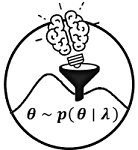elicit.initialization module#
- elicit.initialization.uniform_samples(seed: int, hyppar: List[str], n_samples: int, method: str, mean: float | Iterable[float], radius: float | Iterable[float], parameters: List[Parameter])[source]#
Sample from uniform distribution for each hyperparameter.
- Parameters:
- seedint
user-specified seed defined in
elicit.elicit.trainer().- hypparlist
list of hyperparameter names (strings) declaring the order for the list of means and radius. If means and radius are each a float, then this number is applied to all hyperparameter such that no order of hyperparameter needs to be specified. In this case
hyppar=None- n_samplesint
number of samples from the uniform distribution for each hyperparameter.
- methodstr
name of sampling method used for drawing samples from uniform. Currently implemented are “random”, “lhs”, and “sobol”.
- meanfloat or list
Specification of the uniform distribution. The uniform distribution ranges from (mean-radius) to (mean+radius).
- radiusfloat or list
Specification of the uniform distribution. The uniform distribution ranges from (mean-radius) to (mean+radius).
- parameterslist
list including dictionary with all information about the (hyper-)parameters. Can be retrieved as attribute from the initialized
elicit.elicit.Elicitobj (i.e.,eliobj.parameters)
- Returns:
- res_dictdict
dictionary with keys being the hyperparameters and values the samples from the uniform distribution.
- Raises:
- ValueError
methodmust be either “sobol”, “lhs”, or “random”.n_samplesmust be a positive integer- TypeError
arises if
methodis not a string.
- elicit.initialization.init_runs(expert_elicited_statistics: Dict[str, Tensor], initializer: Initializer, parameters: List[Parameter], trainer: Trainer, model: Dict[str, Any], targets: List[Target], network: Optional, expert: ExpertDict, seed: int)[source]#
Computes the discrepancy between expert data and simulated data for multiple hyperparameter initialization values.
- Parameters:
- expert_elicited_statisticsdict
user-specified expert data as provided by
elicit.elicit.Expert().- initializerdict
user-input from
elicit.elicit.initializer().- parameterslist
user-input from
elicit.elicit.parameter().- trainerdict
user-input from
elicit.elicit.trainer().- modeldict
user-input from
elicit.elicit.model().- targetslist
user-input from
elicit.elicit.target().- networkdict, optional
user-input from one of the methods implemented in the
elicit.networksmodule.- expertdict
user-input from
elicit.elicit.Expert().- seedint
internal seed for reproducible results
- Returns:
- loss_listlist
list with all losses computed for each initialization run.
- init_var_listlist
list with initializer prior model for each run.
- init_matrixdict
dictionary with keys being the hyperparameter names and values being the drawn initial values per run.
- elicit.initialization.init_prior(expert_elicited_statistics: Dict[str, Tensor], initializer: Initializer | None, parameters: List[Parameter], trainer: Trainer, model: Dict[str, Any], targets: List[Target], network: NFDict | None, expert: ExpertDict, seed: int)[source]#
Extracts target loss, corresponding initial hyperparameter values, and initialized prior model from
init_runs().- Parameters:
- expert_elicited_statisticsdict
user-specified expert data as provided by
elicit.elicit.Expert().- initializerdict, optional
user-input from
elicit.elicit.initializer().- parameterslist
user-input from
elicit.elicit.parameter().- trainerdict
user-input from
elicit.elicit.trainer().- modeldict
user-input from
elicit.elicit.model().- targetslist
user-input from
elicit.elicit.target().- networkdict, optional
user-input from one of the methods implemented in the
elicit.networksmodule.- expertdict
user-input from
elicit.elicit.Expert().- seedint
internally used seed for reproducible results
- Returns:
- init_prior_model
elicit.simulations.Priorsobject initialized priors that will be used for the training phase.
- loss_listlist
list with all losses computed for each initialization run.
- init_priorlist
list with initializer prior model for each run.
- init_matrixdict
dictionary with keys being the hyperparameter names and values being the drawn initial values per run.
- init_prior_model
- elicit.initialization.uniform(radius: float | List[float] = 1.0, mean: float | List[float] = 0.0, hyper: List[str] | None = None) Uniform[source]#
Specification of uniform distribution used for drawing initial values for each hyperparameter. Initial values are drawn from a uniform distribution ranging from
mean-radiustomean+radius.- Parameters:
- radiusfloat or list[float]
Initial values are drawn from a uniform distribution ranging from
mean-radiustomean+radius. If afloatis provided the same setting will be used for all hyperparameters. If different settings per hyperparameter are required, alistof length equal to the number of hyperparameters should be provided. The order of values should be equivalent to the order of hyperparameter names provided in hyper. The default is1..- meanfloat or list[float]
Initial values are drawn from a uniform distribution ranging from
mean-radiustomean+radius. If afloatis provided the same setting will be used for all hyperparameters. If different settings per hyperparameter are required, alistof length equal to the number of hyperparameters should be provided. The order of values should be equivalent to the order of hyperparameter names provided in hyper. The default is0..- hyperlist[str], optional
List of hyperparameter names as specified in
elicit.elicit.hyper(). The values provided in radius and mean should follow the order of hyperparameters indicated in this list. If a float is passed to radius and mean this argument is not necessary.
- Returns:
- init_dictdict
Dictionary with all seetings of the uniform distribution used for initializing the hyperparameter values.
- Raises:
- AssertionError
hyper,mean, andradiusmust have the same length.

